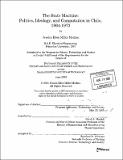| dc.contributor.advisor | David A. Mindell. | en_US |
| dc.contributor.author | Miller Medina, Jessica Eden | en_US |
| dc.contributor.other | Massachusetts Institute of Technology. Program in Science, Technology and Society. | en_US |
| dc.date.accessioned | 2007-10-19T20:26:47Z | |
| dc.date.available | 2007-10-19T20:26:47Z | |
| dc.date.copyright | 2005 | en_US |
| dc.date.issued | 2005 | en_US |
| dc.identifier.uri | http://hdl.handle.net/1721.1/39176 | |
| dc.description | Thesis (Ph. D. in History and Social Study of Science and Technology (HASTS))--Massachusetts Institute of Technology, Program in Science, Technology and Society, 2005. | en_US |
| dc.description | Includes bibliographical references (v. 2, leaves 343-392). | en_US |
| dc.description.abstract | This dissertation argues that Chile's history of computing is tightly interwoven with the history of the Chilean state. It begins by documenting the government use of mechanical tabulating machines during the 1920s and 1930s and concludes with the disbanding of the state computer enterprise known as ECOM in 1991. The dissertation pays particular attention to the period between 1964 and 1973, which was marked by the presidencies of Christian Democrat Eduardo Frei Montalva and Socialist Salvador Allende Gossens. The dissertation addresses three central questions. First, it asks how Chilean economic policies and political events shaped the country's technological history. Second, it asks what we can learn from computers if we treat them as texts for understanding historical processes in Chile, the Latin American region, and the developing world. Finally, it addresses how Chile's political leaders used computing machines in their attempts to control Chile's social, economic, and political development and to forward their plans to modernize the Chilean nation. It argues that computers proved valuable not only in producing the Chile of today but in articulating national goals that changed over time. | en_US |
| dc.description.abstract | (cont.) Government, use of computers both reflected and made possible the ideological programs of developmentalism, socialism, and neoliberalism that dominated Chilean politics during the period under study. Based predominantly on archival research and oral history interviews, the dissertation follows a narrative format. It shows how computing technologies contributed to the practice of statecraft, influenced ideas of modernization, and reflected the tensions between Chile and the industrialized nations of the developed world. | en_US |
| dc.description.statementofresponsibility | by Jessica Eden Miller Medina. | en_US |
| dc.format.extent | 2 v. (392 leaves) | en_US |
| dc.language.iso | eng | en_US |
| dc.publisher | Massachusetts Institute of Technology | en_US |
| dc.rights | M.I.T. theses are protected by copyright. They may be viewed from this source for any purpose, but reproduction or distribution in any format is prohibited without written permission. See provided URL for inquiries about permission. | en_US |
| dc.rights.uri | http://dspace.mit.edu/handle/1721.1/7582 | |
| dc.subject | Program in Science, Technology and Society. | en_US |
| dc.title | The State Machine : politics, ideology, and computation in Chile, 1964-1973 | en_US |
| dc.type | Thesis | en_US |
| dc.description.degree | Ph.D.in History and Social Study of Science and Technology (HASTS | en_US |
| dc.contributor.department | Massachusetts Institute of Technology. Program in Science, Technology and Society | |
| dc.identifier.oclc | 62715819 | en_US |
